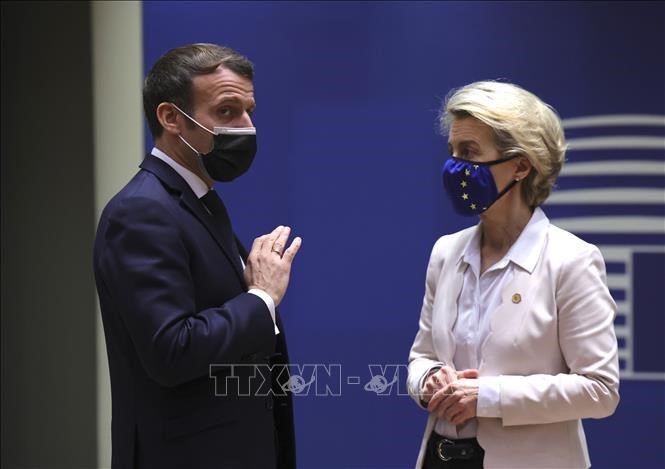(VOVWORLD) -EU leaders are meeting in Brussels to discuss further coordination on COVID-19, climate change, security and external relations.
 The Summit of the European Union (EU) in Brussels, Belgium, December 10, 2020 (Photo: AFP / VNA) The Summit of the European Union (EU) in Brussels, Belgium, December 10, 2020 (Photo: AFP / VNA)
|
Major progress
On the opening day of the Summit on Friday, EU leaders reached an important agreement on the EU budget for the 2021-2027 period and a COVID-19 recovery package worth 1.8 trillion euros (2.1 trillion USD). The sum includes a budget of 1.1 trillion euros for the next 7 years and a 750-billion-euro recovery plan called "New Generation EU". The recovery package will help sustain the EU transition through the Green Agreement, the digital revolution, and stronger growth.
The consensus followed Poland, Hungary, and Germany—the current EU president—coming to an agreement on the new long-term budget plan. Earlier, Poland and Hungary had blocked a budget and recovery plan agreed by EU leaders in July over an attached condition which required member states to adhere to EU laws.
European Council President Charles Michel applauded this progress, saying the EU can now begin budget allocation and economic recovery. He said the recovery package will promote the members’ green energy transition and digital transformation. European Commission President Ursula von der Leyen announced on Twitter that "Europe is moving forward," and said she expects this plan to fuel recovery and help build a greener, stronger, digitized EU.

French President Emmanuel Macron (left) and European Commission President Ursula von der Leyen at the EU Summit in Brussels, Belgium, December 10, 2020.
(Photo: REUTERS/VNA)
|
Heavy challenges ahead
It is likely that EU leaders will agree on a new EU emission reduction target for 2030, which will allow the EU to submit its Nationally Determined Contributions (NDCs) updates to the United Nations Framework Convention on Climate Change before the end of this year.
The Summit also discussed relations with the US, tensions in the Eastern Mediterranean, and relations with Turkey, which analysts called the biggest challenges facing the EU now and in the near future.
The EU can only improve relations with the US once a new administration takes shape in the US. President Donald Trump’s "America First" policy has stagnated EU-US relations or even threatened to move them backwards by withdrawing one third of the US troops in Germany.
The EU's handling of Eastern Mediterranean tensions has been complicated by Turkey’s "ace card": the EU’s desire for Turkey to absorb migrants from Syria and other Middle East war zones intent on relocating to the EU.
A further challenge is the imminent risk of a no-deal with the UK. Negotiations are deadlocked with the Brexit transition period about to expire on December 31.
Obviously, EU leaders are shouldering many heavy burdens at the moment. Their Special Summit appears to be a necessary effort but probably not sufficient to clear the obstacles of 2020 and enter 2021 with brighter prospects.